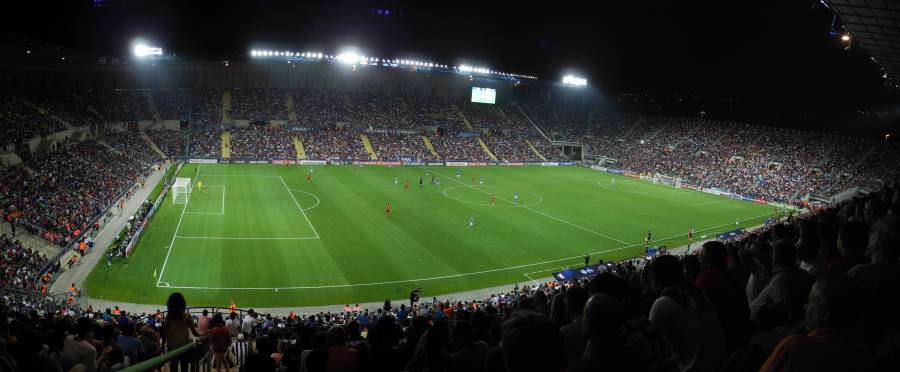The failure to confront Beitar Jerusalem and La Familia has entrenched Palestinian perceptions of an Israeli society that is inherently racist.
Israel’s Equal Employment Opportunities Commission (EEOC) has demanded that Beitar Jerusalem, a racist soccer club, retract recent statements that it would maintain its policy of not hiring Palestinian players due to opposition from the team’s militant, racist fan base.
The demand comes as Israel is fighting an attempt by the Palestine Football Association (PFA) to get the Jewish state suspended from FIFA. The PFA charges that Israel hinders the development of Palestinian soccer by obstructing the travel of players between the West Bank and the Gaza Strip as well as abroad.
Senior Israeli soccer officials are in Europe this week for talks with FIFA President Sepp Blatter and Michel Platini, the head of UEFA, in a bid to block the PFA effort. They counter the Palestinian assertion by insisting that the Israel Football Association (IFA) has no say in Israeli security policy.
The PFA effort is part of a broader campaign by President Mahmoud Abbas’ Palestinian Authority to pressure and isolate Israel following the failure of peace talks. The Palestinians have since joined multiple United Nations organizations, including the International Criminal Court (ICC). FIFA was the first international group to recognize Palestine as far back as 1998.
An Israeli law firm joined the Israeli-Palestinian battle in international organizations with a petition to the ICC, which calls for an investigation on PFA President Gen. Jibril Rajoub over alleged war crimes during the Gaza War in 2014.
It is hard to assume that the demand by the EEOC is not in part related to the battle over Israel’s status in FIFA, given that the commission has not acted in the past against Beitar Jerusalem, the only top flight Israeli soccer club to have not hired Palestinian players, even though Palestinians rank among the country’s top performers. Beitar’s nationalist ideology is embedded in its name, a reference to the Jews’ last standing fortress in the second century Bar Kochba revolt against the Romans.
Even though the IFA is the only Middle Eastern soccer body to have an anti-racism program, it has slapped Beitar Jerusalem on the wrist but always stopped short of investigating the club’s persistent racism. Beitar, which has long enjoyed the support of Israeli leaders, including Prime Minister Binyamin Netanyahu and other prominent right-wing personalities, has the worst disciplinary record in Israel’s Premier League.
In 2013, Beitar’s rabidly anti-Palestinian, anti-Muslim La Familia support group sparked rare national outrage, when it unfurled a banner asserting that “Beitar will always remain pure,” in protest against the club’s brief hiring of two Muslim players from Chechnya: Zaur Sadayev and Dzhabrail Kadiyev. It was the group’s use of language associated with German National Socialism that sparked outrage against its consistent racism.
Nonetheless, La Familia operates in an environment in which racism, racial superiority, bigotry and double-standards — and little sincere effort to address these issues, which undermines Israel’s projection of itself as a democratic state — emerge from the country’s soccer pitches. Writing in Soccer and Society, Israeli scholar Amir Ben-Porat warns:
“The football stadium has become an arena for protest: political, ethnic, nationalism, etc … ‘Death to the Arabs’ has thus become [a] common chant in football stadiums … Many Israelis consider the Israeli Arabs [Palestinians] to be ‘Conditional Strangers,’ that is temporary citizens … Contrary to conventional expectations, these fans are not unsophisticated rowdies, but middle-class political-ideological right-wingers, whose rejection of Arab football players on their team is based on a definite conception of Israel as a Jewish (Zionist) state.”
Coach Guy Levy
Responding to comments by Beitar Jerusalem Coach Guy Levy, IFA President Ofer Eini said: “[His] words are not appropriate and their racist scent certainly doesn’t contribute to Israeli soccer and Israeli society. As a coach and an educator, it would have been better had he avoided comments which can serve those who want to divide Israeli society.” Eini did not include any potential punitive action against Beitar in his statement.
The EEOC and the IFA took issue with a statement made by Levy in a radio interview: “It doesn’t matter that this is the right time; it would create tension and cause much greater damage. I won’t find any player from the Arab sector who would want to. Even if there was a player who suited me professionally, I wouldn’t bring him, because it would create unnecessary tension.” Levy said that opposition by La Familia, whom he praised, meant he would not sign Bibras Natcho, an Israeli international soccer player and a Circassian Muslim, as it would stir unrest among the club’s supporters. “My job is to coach the team, not to educate anyone,” Levy said.
Natcho, a CSKA Moscow midfielder, asked Levy on Twitter: “What would happen if a European coach would have announced that he doesn’t want a Jewish player on his team?”
EEOC Commissioner Tziona Koenig-Yair claimed that Levy’s comments constituted “suspicion of racism in contravention of the law prohibiting discrimination based on nationality, among other things in acceptance to employment.”
Levy’s assertion that Palestinian players would not want to play for Beitar, presumably due to the explicit racist chants — and attacks — against Palestinians and Muslims by La Familia, was belied by Mohammed Ghadir, a Palestinian striker, who in 2011 said he wanted to play for Beitar but was rejected. “I am well-suited to Beitar, and that team would fit me like a glove. I have no qualms about moving to play for them,” Ghadir said at the time. The EEOC and the IFA failed to step in. In a commentary on Ghadir’s case, Haaretz columnist Yoav Borowitz notes:
“An extraordinarily courageous Arab player has stood up, and fearlessly indicated that he is not afraid to play for Beitar. The Jerusalem squad did not assent to his request — not because he lacks sufficient talent, but because he is an Arab. This is a mark of Cain for Beitar Jerusalem and its fans, and also for the city of Jerusalem, the state of Israel and its legal system, the IFA and also for the media, which continues to cover this soccer team. Day by day, we reinforce and popularize this loathsome form of racism.”
The Club’s Origin
Beitar was founded in 1936 by members of the Beitar movement established in 1923 in Latvia as part of the revanchist Zionist trend. Beitar’s founder, former Ukrainian war reporter Ze’ev Jabotinsky, hoped to imbue its members with a military spirit.
The club initially drew many of its players and fans from Irgun, an extreme nationalist, paramilitary Jewish underground that waged a violent campaign against the pre-state British mandate authorities. As a result, many of them were exiled to Eritrea in the 1940s. Many of La Familia’s members are supporters of Kach, the outlawed, violent and racist party that was headed by assassinated Rabbi Meir Kahane. La Familia frequently displays Kach’s symbols.
Beitar’s initial anthem reflected the club’s politics, glorifying a “guerrilla army racist and tough, an army that calls itself the supporters of Beitar.” That spirit still comes to life when fans of Beitar Jerusalem meet their team’s Palestinian rivals. Their support reaches a feverish pitch as they chant racist, anti-Arab songs and denounce the Prophet Muhammad.
Beitar’s matches often resemble a Middle Eastern battlefield. The club’s hardcore fans — Sephardi Jewish males of Middle Eastern and North African origin, who define their support as subversive and against the country’s Ashkenazi establishment — revel in their status as bad boys. Their dislike of Ashkenazi Jews of eastern European extraction, rooted in resentment against social and economic discrimination, rivals their disdain for Palestinians.
The failure to seriously confront La Familia has entrenched Palestinian perceptions of an Israeli society that is inherently racist. Ahmed Tibi, an Israeli Palestinian member of parliament, has laid the blame for La Familia’s excess at the doorstep of Israeli political and sports leaders: “For years, no one really tried to stop them, not the police, not the club, not the attorney-general and not the Israeli Football Association.”
The views expressed in this article are the author’s own and do not necessarily reflect Fair Observer’s editorial policy.
Photo Credit: Dindia / Roger Gor / Maor X / Wiki Commons
 We bring you perspectives from around the world. Help us to inform and educate. Your donation is tax-deductible. Join over 400 people to become a donor or you could choose to be a sponsor.
We bring you perspectives from around the world. Help us to inform and educate. Your donation is tax-deductible. Join over 400 people to become a donor or you could choose to be a sponsor.
Support Fair Observer
We rely on your support for our independence, diversity and quality.
For more than 10 years, Fair Observer has been free, fair and independent. No billionaire owns us, no advertisers control us. We are a reader-supported nonprofit. Unlike many other publications, we keep our content free for readers regardless of where they live or whether they can afford to pay. We have no paywalls and no ads.
In the post-truth era of fake news, echo chambers and filter bubbles, we publish a plurality of perspectives from around the world. Anyone can publish with us, but everyone goes through a rigorous editorial process. So, you get fact-checked, well-reasoned content instead of noise.
We publish 2,500+ voices from 90+ countries. We also conduct education and training programs
on subjects ranging from digital media and journalism to writing and critical thinking. This
doesn’t come cheap. Servers, editors, trainers and web developers cost
money.
Please consider supporting us on a regular basis as a recurring donor or a
sustaining member.
Will you support FO’s journalism?
We rely on your support for our independence, diversity and quality.









Comment